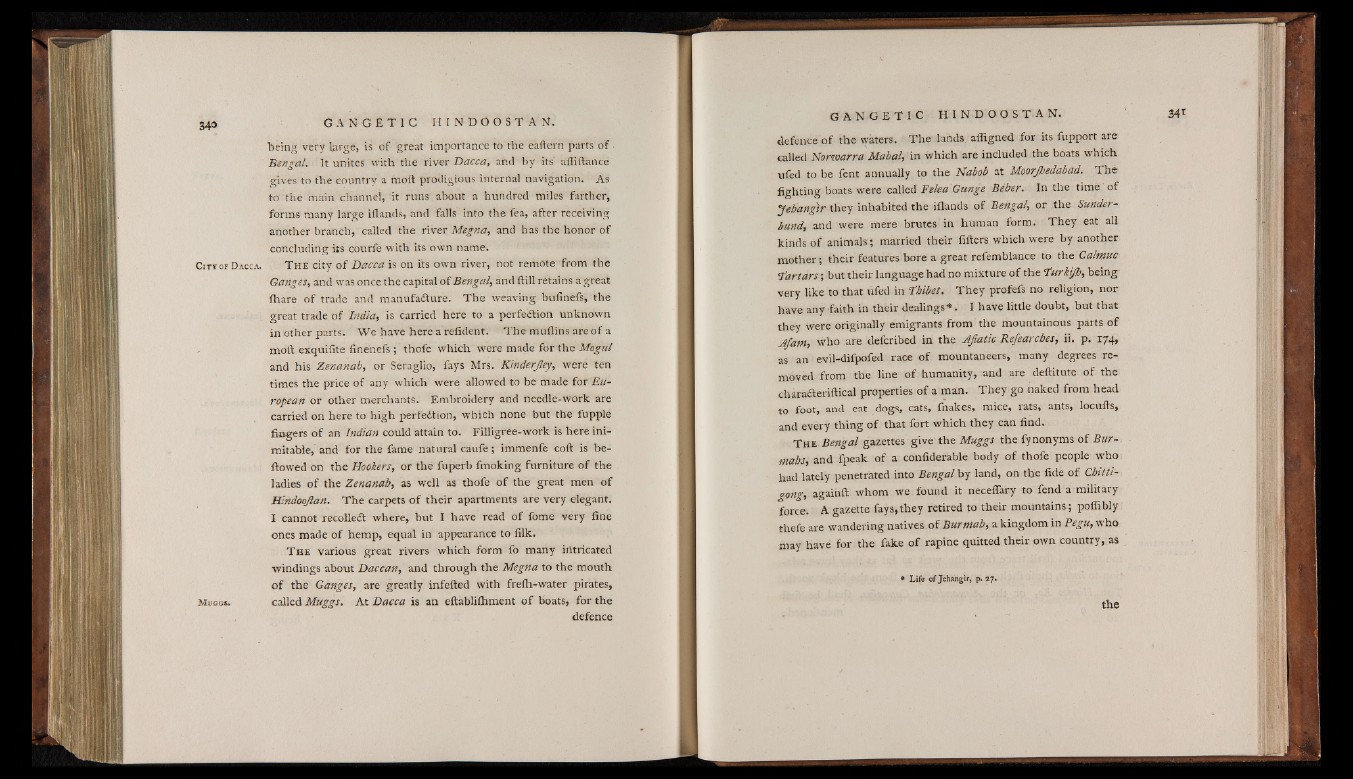
being very large, is of great importance to the eaftern parts of
Bengal. It unites with the river Dacca, and by its' affiftance
gives to the country a moft prodigious internal navigation. As
to the main channel, it runs' about a hundred miles farther,
forms many large iilands, and falls into the fea, after receiving
another branch, called the river Megna, and has the honor of
concluding its courfe with its own name.
C it v of D a c ca . T he city of Dacca is on its own river, not remote from the
Ganges, and was once the capital of Bengal, and ftill retains a great
ihare of trade and manufacture. The weaving bufinefs, the
great trade of India, is carried here to a perfection unknown
in other parts. We have here a refident. The muflins are of a
moft exquifite finenefs; thofe which were made for the Mogul
and his Zenanah, or Seraglio, fays Mrs. Kinderjley, were ten
times the price of any which were allowed to be made for European
or other merchants. Embroidery and needle-work are
carried on here to high perfection, which none but the fupple
fingers o f an Indian could attain to. Filligree-work is here inimitable,
and for the fame natural caufe; immenfe coft is bellowed
on the Hookers, or the fuperb fmoking furniture o f the
ladies of the Zenanah, as well as thofe o f the great men of
Hindoojlan. The carpets of their apartments are very elegant.
I cannot recolleCt where, but I have read of fome very fine
ones made of hemp, equal in appearance to lilk.
T h e various great rivers which form fo many iritricated
windings about Daccan, and through the Megna to the mouth
o f the Ganges, are greatly infefted with frefh-water pirates,
M uggs. called Muggs, At Dacca is an eftabliihment of boats, for the
defence
defence of the waters. The lands afligned for its fupport are
called Norwarra Mahal, in which are included the boats which
ufed to be fent annually to the Nabob at Moorjhedabad. The
fighting boats were called Felea Gunge Beber. In the time of
'Jehangir they inhabited the iilands o f Bengal, or the Sunder-
bund, and were mere brutes in human form. They eat all
kinds of animals; married their filters which were by another
mother; their features bore a great refemblance to the Calmuc
Tartars ; but their language had no mixture o f the Turkijh, being
very like to that ufed in Thibet. They profefs no religion, nor
have any faith in their dealings*. I have little doubt, but that
they were originally emigrants from the mountainous parts of
A/am, who are defcribed in the Afiatic Rejearcbes, ii. p. 174,
as an evil-difpofed race o f mountaneers, many degrees removed
from the line of humanity, and are deftitute of the
charaaeriftical properties of a man. They go naked from head
to foot, and eat dogs, cats, fnakes, mice, rats, ants, locufts,
and every thing of that fort which they can find.
T h e Bengal gazettes give the Muggs the fynonyms of Bur-
mahs, and fpeak of a confiderable body of thofe people who
had lately penetrated into Bengal by land, on the fide o f Chitti-
gong, againft whom we found it neceffary to fend a military
force. A gazette fays, they retired to their mountains; poflibly
thefe are wandering natives o f Burmab, a kingdom in Pegu, who
may have for the fake of rapine quitted their own country, as '
* Life of Jehangir, p. 27.
the